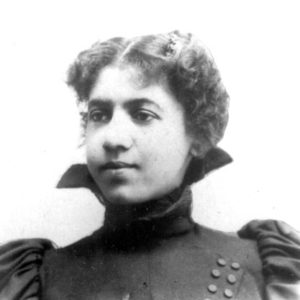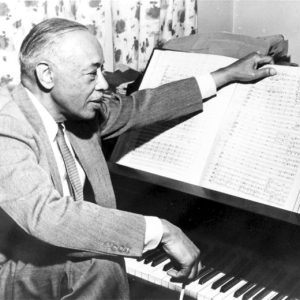calsfoundation@cals.org
Carrie Lena Fambro Still Shepperson (1872–1927)
Carrie Lena Fambro Still Shepperson was an African American teacher and education advocate in Little Rock (Pulaski County) and the mother of composer and musician William Grant Still Jr.
Carrie Fambro was born in 1872, near Milledgeville Georgia to Anne Fambro, a freedwoman. Little is known about her family. Her exact birth date, father’s name, and number of siblings are unknown.
Encouraged by her mother to pursue her education, she graduated from Atlanta University in 1886. In 1893, while teaching at Alabama State Agricultural and Mechanical College, she met William Grant Still, a colleague who taught bookkeeping, instrumental music, and vocal music. Still was an 1892 graduate of Alcorn Agricultural and Mechanical College at Lorman, Mississippi. The couple married and settled in Woodville, Mississippi, in 1894. On May 11, 1895, their son, William Grant Still, Jr., was born at Piney Woods. Still’s husband died on September 26, 1895, at the age of twenty-four.
After her husband’s death, Still moved to Little Rock, where her mother lived. In 1896, she secured a position teaching English at Union School, which was built as Little Rock’s first school for black children. She established a domestic arrangement comprised of her son and her mother in a house located in a biracial neighborhood. In 1904, she married Charles B. Shepperson, a railway postal clerk, and he joined the household. Their union survived until his accidental drowning in 1922.
Shepperson’s teaching career was characteristic of educated black women in the postbellum era. Her paid public work included her position as an English teacher at Union School, Capital Hill, and at M. W. Gibbs High School, respectively.
Her unpaid public work provided an additional forum for her political activism. When the city school system replaced Union School with Capitol Hill in 1902, the new school lacked a library. In an effort to supplement the school’s inadequate funding, Shepperson organized and staged a school-sponsored and student-performed public program in 1916. The proceeds were donated to the school to establish a library at the new site. The benefit production was so successful that Shepperson inaugurated a series of annual productions at Capitol Hill and later at Gibbs High School.
For the first two years, Shepperson staged the programs in the school auditorium. But in 1918 she reserved the Kempner Theater in downtown Little Rock, a segregated venue in which African Americans were restricted to the balcony, for Friday and Saturday night performances. The shows sold out for both performances, in part because the black community wanted to sit on the first floor customarily reserved for “whites only.”
Shepperson’s annual school productions reflected a sense of racial obligation or “socially responsible individualism” characteristic among professional black women. Shepperson used the annual programs as a vehicle to mentor black youth and encourage creative expression and academic skills among the students. She also used the shows to challenge dominant attitudes regarding race and gender.
Shepperson also engaged in social and literary activities as a leader of the Lotus Club, whose members met regularly to discuss books, current events, and research. At the time of her death she had completed an unpublished manuscript.
Shepperson died on May 18, 1927, and is buried in Little Rock’s Fraternal Cemetery.
For additional information:
Arvey, Verna. In One Lifetime. Fayetteville: University of Arkansas Press, 1984.
Still, Judith Anne. “Carrie Still Shepperson: The Hollows of Her Footsteps.” Arkansas Historical Quarterly 42 (Spring 1983): 37–46
Still, William Grant. “My Arkansas Boyhood.” Arkansas Historical Quarterly 26 (Autumn 1967): 285–92.
William Grant Still Collection. Special Collections. University of Arkansas Libraries, Fayetteville, Arkansas.
Fon Louise Gordon
University of Central Florida
This entry, originally published in Arkansas Biography: A Collection of Notable Lives, appears in the CALS Encyclopedia of Arkansas in an altered form. Arkansas Biography is available from the University of Arkansas Press.
 Education, Elementary and Secondary
Education, Elementary and Secondary Post-Reconstruction through the Gilded Age, 1875 through 1900
Post-Reconstruction through the Gilded Age, 1875 through 1900 Carrie Shepperson
Carrie Shepperson  William Grant Still
William Grant Still 




Comments
No comments on this entry yet.